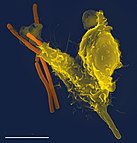From today's featured articleThe immune system is a network of biological processes that protects an organism against disease. It detects and responds to a wide variety of pathogens, from viruses to parasitic worms, as well as cancer cells and objects such as wood splinters, distinguishing them from the organism's own healthy tissue. Many species have two major subsystems of the immune system. The innate immune system provides a preconfigured response to broad groups of situations and stimuli. The adaptive immune system provides a tailored response to each stimulus by learning to recognize molecules it has previously encountered. Both use molecules and cells to perform their functions. Humans have sophisticated defense mechanisms, including the ability to adapt to recognize pathogens more efficiently. Adaptive (or acquired) immunity creates an immunological memory leading to an enhanced response to subsequent encounters with that same pathogen. This process of acquired immunity is the basis of vaccination. (Full article...)
Recently featured:
Did you know ... Black-on-black ware pot from San Ildefonso Pueblo
|
In the news
On this dayDecember 30: Rizal Day in the Philippines (1896)
More anniversaries:
|
Today's featured picture

|
|
The llama (Lama glama) is a domesticated South American camelid, widely used as a meat and pack animal by Andean cultures since the pre-Columbian era. A full-grown llama can reach a height of 1.7 to 1.8 metres (5 ft 7 in to 5 ft 11 in) at the top of the head, and can weigh between 130 and 200 kilograms (290 and 440 lb). At birth, a baby llama (known as a cria) can weigh between 9 and 14 kilograms (20 and 31 lb). Llamas typically live for 15 to 25 years, with some individuals surviving 30 years or more. This photograph shows a dam (female llama) and her cria at Laguna Colorada in Eduardo Avaroa Andean Fauna National Reserve, Bolivia. Photograph credit: Kallerna
Recently featured:
|
Other areas of Wikipedia
- Community portal – Bulletin board, projects, resources and activities covering a wide range of Wikipedia areas.
- Help desk – Ask questions about using Wikipedia.
- Local embassy – For Wikipedia-related communication in languages other than English.
- Reference desk – Serving as virtual librarians, Wikipedia volunteers tackle your questions on a wide range of subjects.
- Site news – Announcements, updates, articles and press releases on Wikipedia and the Wikimedia Foundation.
- Village pump – For discussions about Wikipedia itself, including areas for technical issues and policies.
Wikipedia's sister projects
Wikipedia is hosted by the Wikimedia Foundation, a non-profit organization that also hosts a range of other projects:
Free media repository
Wiki software development
Wikimedia project coordination
Free textbooks and manuals
Free knowledge base
Free-content news
Collection of quotations
Free-content library
Directory of species
Free learning resources
Free travel guide
Dictionary and thesaurus


